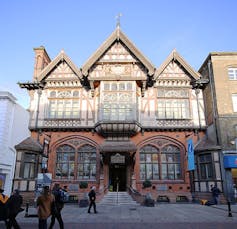England and Wales are currently full of babies that, in the eyes of the state, do not exist. That’s due to a huge backlog in birth registrations, after councils around the country halted the process during lockdown. Birth certificates are only now beginning to be reissued.
Without a birth certificate, parents have been unable to apply for a passport for their children, open a savings account, or, crucially, get access to childcare. Part of the problem is that, in England and Wales, it’s a legal requirement for births to be registered in person. Parents must travel to a registration office within their local district to do so.
At the face-to-face meeting, they must provide details such as the place and date of birth and the name of the child and sign a register in the presence of a registrar. Only then can parents purchase a birth certificate.
For those parents who are married or in a civil partnership, either parent can register the birth on their own. For those who are unmarried, both parents must attend and sign the register together or bring a form signed by the other parent.

WeHaveEverything/Shutterstock
In normal times, registration must be done within 42 days of a baby’s birth. After this point, parents will receive a letter telling them to make an appointment. If the birth remains unregistered after 12 months, parents can be fined up to £200. If the parents still refuse, the local authority can intervene as an “institutional parent” to register the birth.
The history of birth registrations
The modern system of civil registration has its roots in the documentation of Christian rites of passage in the Tudor age. In September 1538, Henry XVIII’s right-hand man, Thomas Cromwell, ordered local parishes to keep a record of baptisms, weddings and burials. Every church had to keep one register.
Each Sunday, the vicar listed the week’s rituals, noting the date and year of the baptism, marriage or funeral ceremony and the names of those involved. This would be done in the presence of two church wardens who would witness the process and sign the register.

Although it was the Christian “soul” that was recorded in this process, the parish registers were still legal documents. As Cromwell explained, the records provided proof of age, family and local connections, and could be used to settle legal disputes relating to property and inheritance. This system continued for centuries.
By the 19th century, parish records were in poor condition, and the country’s growing non-Anglican population was excluded from the church-based system. The government of Earl Grey’s 1834 Poor Law Act, which reformed poverty programmes in England and Wales, paved the way for a new system of civil registration.
Under the act, the nation was divided into registration districts. Registrars were appointed, and a central archive was set up at Somerset House, London, known as the General Register Office.
Why face-to-face registration matters
With the bureaucratic issues cased by coronavirus, it’s worth asking whether it’s time to update this centuries-old process. When the governent announced lockdown, it passed an emergency law to change the registration of deaths and still-births, scrapping face-to-face meetings for these procedures. Relatives and hospital staff can now give details over the phone, without a signature being required.
Could this also be done for birth registration? Similar procedures are in place across North America, where birth data is sent to the state by parents, doctors, midwives and hospitals via paper or online forms, and a birth certificate is sent back via the post.
In British Columbia, Canada, parents are able to apply for other state benefits when they register a birth online. If the UK government wanted to simplify registration for England and Wales, this seems a useful approach.
Yet my ongoing research on registration of life events shows that face-to-face meetings are a very important part of the birth registration process for parents. It would be a shame if this crisis meant we lost this dimension entirely.

Geni, CC BY-SA
In my city of Canterbury, birth registration takes place at the Beaney House of Art & Knowledge – a museum, gallery, library, café, tourist information desk, community exhibition space and cultural hub in east Kent. Here, parents register births alongside tourists, visitors and local residents. The Beaney shows that the requirements of the law can be carried out in everyday community spaces – the importance of which should not be readily forgotten.
The birth certificate is a “passport to protection”, in the words of UNICEF, which proves that a baby has legal status. It is crucial that all newborns receive a certificate as soon as possible, pandemic or no pandemic. But we should think carefully before removing face-to-face registration appointments entirely.
The law provides a space in which the bureaucratic act of registration can take on a deeper meaning. Places like the Beaney show parents that there are local services available them as their child grows up. And they tell the child not only that they simply “exist”, but that they are also part of a community.
![]()
Jessica Smith does not work for, consult, own shares in or receive funding from any company or organisation that would benefit from this article, and has disclosed no relevant affiliations beyond their academic appointment.











